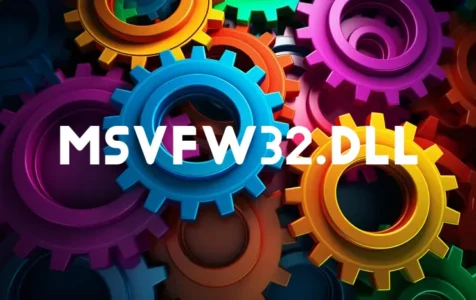The msvfw32.dll file stands for ‘Microsoft Video for Windows DLL’ and is a vital component of the Windows operating system. This dynamic link library file is essential for the proper functioning of video-related applications on Windows computers. DLL files like msvfw32.dll serve as a set of instructions that different programs can call upon to perform certain operations. This file is specifically used to play and manage video content on Windows-based systems.
Is msvfw32.dll Safe to Run?
Yes, the msvfw32.dll file is a safe and legitimate file created by Microsoft. It should normally not pose any security risks as it is a trusted part of the Windows operating system necessary for running video applications.
Could it be a Virus or Malware?
The genuine msvfw32.dll file provided by Microsoft is not a virus or malware. However, it is possible for viruses or malware to be disguised under the same name. Always ensure that DLL files are obtained from trusted sources and avoid downloading DLLs from unauthorized websites. Moreover, it’s crucial to maintain updated antivirus software to detect and prevent threats.
Common Issues Associated with msvfw32.dll
Some common issues related to msvfw32.dll include error messages such as “msvfw32.dll Missing,” “msvfw32.dll Not Found,” or “msvfw32.dll is either not designed to run on Windows or it contains an error.” These issues can arise due to deletion of the DLL file, corruption from malware, registry problems, or conflicts with outdated drivers or software.
Expert Tip: For smoother PC performance, consider using a PC optimization tool. It handles junk files, incorrect settings, and harmful apps. Make sure it's right for your system, and always check the EULA and Privacy Policy.
Special offer. About Outbyte, uninstall instructions, EULA, Privacy Policy.
Fixing msvfw32.dll Issues
Here are several methods to resolve problems with the msvfw32.dll file:
1. Scan for Malware: Use an antivirus program to scan your system for malware that may be masquerading as the msvfw32.dll file or that has corrupted the genuine file.
2. System File Checker (SFC) Scan: Utilize the built-in Windows tool SFC to scan for and restore corrupted or missing system files.
– Open Command Prompt with administrator privileges.
– Enter the command: sfc /scannow
– Wait for the scan to finish and follow any prompts to repair files.
3. Check for Windows Updates: Ensure that your Windows OS is up to date, as updates can provide fixes for system file issues.
4. Reinstall the Application: If a specific application is causing the error, try reinstalling it to ensure it correctly installs the necessary DLL files.
5. Manual DLL File Replacement: If you’re an advanced user, manually replacing the msvfw32.dll file from a trusted source can solve the issue. Remember to register the new DLL using the Regsvr32 command or place it in the application’s installation folder if required.
6. Restore from Backup: If you have a recent backup of your system, you can restore the msvfw32.dll file from there.
7. Perform a System Restore: If the above steps do not solve the problem, consider doing a System Restore to revert your system back to a previous state when everything worked correctly.
Before attempting manual fixes, it is recommended to create a backup of your system to prevent any accidental data loss.
User Experiences and Community Discussions
Users have shared their experiences in community forums like Microsoft Answers, seeking assistance for msvfw32.dll errors. Some have reported success with replacing the DLL file, while others have mentioned that reinstalling the problematic software solved the issue. It’s important to read through such discussions to gauge the effectiveness of different solutions. Microsoft community discussion on msvfw32.dll details various attempts and solutions tried by users.
Always ensure you are downloading DLL files from reputable sources.
In conclusion, if you encounter issues with msvfw32.dll, it is crucial to address them swiftly. Use the Windows built-in tools or consult expert forums for advice, and remember to use antivirus software to protect against any malicious versions of DLL files.
